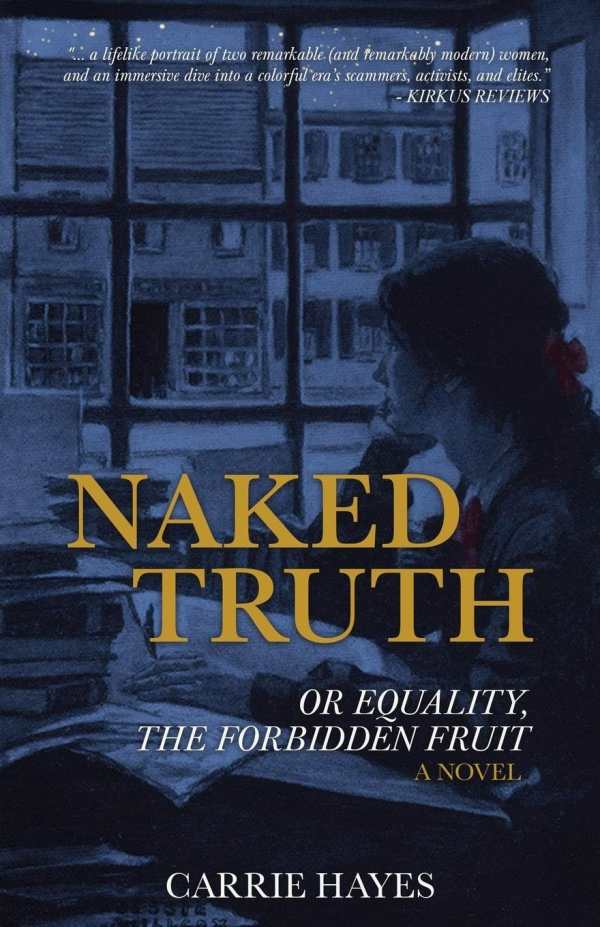Naked Truth
Or Equality, the Forbidden Fruit
The Naked Truth retells American women’s history in a sensitive, intimate way.
Carrie Hayes’s charming historical novel Naked Truth dramatizes the lives of two American suffragettes, Tennessee Claflin and Victoria Woodhull, as they fight for autonomy and equal rights in the mid-1800s.
Tennessee and Victoria have become famous, if not infamous, for their occult skills in mediumship, as well as the other physical “healing services” they provide to men. Frustrated by their position in society as little more than talkative possessions, Tennie and Victoria decide to join the movement for women’s rights, starting with suffrage.
The sisters soon find that callous men and fickle suitors are not their only block to equality: influential women like Susan B Anthony and Harriet Beecher Stowe hold prejudices towards Tennie and Victoria due to their class, profession, and position on “free love,” which heightens rumors of their illicit sexual histories. Despite dodging danger and dealing with those who seek to destroy them, Tennessee and Victoria change American history.
The novel is told most through Tennessee’s lens and focuses on her experiences and relationships, though Victoria’s story is also prominent. The sisters have seen oppression and violence against women firsthand, affecting their beliefs. They share many qualities, like determination, resilience, and a fierce sense of self-sovereignty that often gets them into trouble with powerful people. Still, when their paths are blocked by the intertwined roots of money, power, and politics, Tennie and Vicky blaze their own trail.
They become the first women to open a brokerage firm in New York and create a new political party; Victoria even becomes the first woman to run for president. Their interactions with other famous folks in history are fictionalized, but the book’s dialogue captures the essence of the time period, especially Tennessee and Victoria’s sharp wits during conversations. Many of Victoria’s actual speeches and Tennessee’s letters and journal entries are woven in, providing real context and information that supplements the narrative, in addition to an afterword that clarifies what’s truth and what’s fiction.
Tennie’s connections with men are uncharacteristic for the times; besides one ill-fated marriage in her youth, she has no desire to get married, thus preserving her independence. Rumors fly about both she and Victoria, often overheard in clips of dialogue during social events and political gatherings. Despite the chatter and her reputation for sex work, Tennie does not sleep with many men, due to concerns about a potential STI. Her painful experiences with skin lesions are documented in scenes full of oil-snake remedies and muslin bandages, degrading not only her body but self-worth.
Tennessee’s friendship and mixed feelings towards newspaper owner James Gordon Bennett Jr. are conveyed through endearing exchanges and tender moments, but also betrayals that propel the book’s romantic tension. Tennessee’s friend, a Black spiritualist, Paschal Randolph, also adds his name to Tennie’s list of admirers, and their relationship helps to explore the complicated dynamics between white women and Black men, as both groups compete for the right to vote and are subject to strict social rules of behavior. Tennessee and Victoria’s story seems to stop short, but a few chapters of the sequel are included at the end, promising a continuation of their amazing tale.
The Naked Truth retells American women’s history in a sensitive, intimate way.
Reviewed by
Delia Stanley
Disclosure: This article is not an endorsement, but a review. The publisher of this book provided free copies of the book and paid a small fee to have their book reviewed by a professional reviewer. Foreword Reviews and Clarion Reviews make no guarantee that the publisher will receive a positive review. Foreword Magazine, Inc. is disclosing this in accordance with the Federal Trade Commission’s 16 CFR, Part 255.

